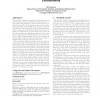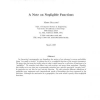978 search results - page 6 / 196 » Knowledge, Probability, and Adversaries |
119
click to vote
CRYPTO
2006
Springer
15 years 5 months ago
2006
Springer
Abstract. We consider the problem of random selection, where p players follow a protocol to jointly select a random element of a universe of size n. However, some of the players ma...
115
click to vote
CORR
2011
Springer
14 years 8 months ago
2011
Springer
In this paper, we study the average case complexity of the Unique Games problem. We propose a natural semi-random model, in which a unique game instance is generated in several st...
108
click to vote
ATAL
2010
Springer
15 years 24 days ago
2010
Springer
The problem of multi-robot patrol in adversarial environments has been gaining considerable interest during the recent years.In this problem, a team of mobile robots is required t...
JOC
2002
15 years 1 months ago
2002
In theoretical cryptography, one formalizes the notion of an adversary's success probability being "too small to matter" by asking that it be a negligible function ...
CEEMAS
2005
Springer
15 years 7 months ago
2005
Springer
Adversariality of the agents with respect to the multi-agent system can be a serious issue in the design of open multi-agent systems. Until now, many incoherent definitions of suc...


